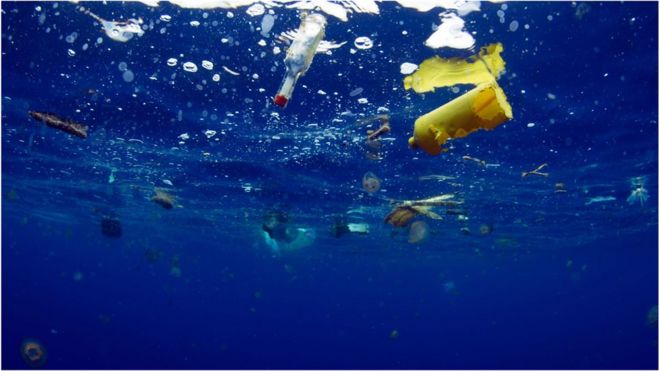Futures Forum: An international plastics treaty could avert a 'Silent Spring' for our seas
Next week's Royal Geographical Society conference will consider the case:
Annual international conference
Supported by ClientEarth:
ClientEarth | Environmental lawyers, environmental law
Oceans | EU marine protection and environmental law | ClientEarth
Here is coverage by the BBC:
Ocean plastic tide 'violates the law'
 BBC BLUE PLANET II
BBC BLUE PLANET II
The global tide of ocean plastic pollution is a clear violation of international law, campaigners say.
They have been urging for a new global treaty to tackle the problem.
But a new report - to be presented to a Royal Geographical Society conference on Tuesday - says littering the sea with plastics is already prohibited under existing agreements. The report urges those governments that are trying to tackle the issue to put legal pressure on those that are not.
The paper (downloadable PDF) has been written by the veteran environment journalist Oliver Tickell. It has been produced as Irish scientists publish details of a study in which they found microplastics in three-in-every-four deep-water fish sampled in the northwest Atlantic.
Plastic 'hand-wringing'
Mr Tickell's principal conclusion is backed by ClientEarth, the legal group that successfully sued the UK over failures to meet air pollution laws. The journalist says legal action against big polluters such as China, India and Indonesia can be taken only by a nation state. So he calls for governments and green groups to support small island nations suffering most from plastic pollution.
- Plastic waste 'building up' in Arctic
- Plastic pollution in seven charts
- 'Shame and anger' at plastic pollution
Tickell maintains that marine plastic litter can already be controlled through the United Nations Convention on the Law of the Sea (UNCLOS); the London Convention; the MARPOL Convention; the Basel Convention; Customary Law, and many other regional agreements. Article 194 of UNCLOS, for instance, requires states to "prevent, reduce and control pollution of the marine environment from any source.
"Measures shall include, inter alia, those designed to minimize to the fullest possible extent... the release of toxic, harmful or noxious substances, especially those which are persistent, from land-based sources… [and] shall include those necessary to protect and preserve rare or fragile ecosystems as well as the habitat of depleted, threatened or endangered species and other forms of marine life."

Tickell adds: "Amid all the hand-wringing over ocean plastic, the fact that it's actually illegal has scarcely been mentioned. Sadly, very few states are in compliance with those obligations they have committed to."
He says offenders could be taken to the International Court of Justice and ordered to pay compensation. But Tickell warns that enforcement is not easy as only nation states are able to bring a case. He believes small islands suffering the worst impacts of marine plastic pollution may be fearful of confronting the generally larger, more powerful countries responsible for the problem. China, India and Indonesia are among the worst culprits.
A spokesman for ClientEarth told BBC News: "Under current international law, states already have the obligation to prevent, control and reduce marine plastic pollution. A new convention might impose more specific action, but the political energy needed for a new international agreement could be put to better use. Negotiating a new international agreement is not a pre-requisite for action at the national level."
A spokesman for the Chinese government told BBC News: "China has implemented a series of laws and regulations to tackle the problem of marine plastic litter. We hope the sea could become cleaner and the living environment of mankind could become more beautiful and sustainable with joint efforts from all countries."
Tuesday's conference is organised by a campaign group called Artists Project Earth. It is proposing the Ocean Plastic Legal Initiative.
Textile fibres
Just as Mr Tickell was outlining his report, scientists led from the National University of Ireland, Galway, published a study that set out the magnitude of microplastic pollution in our oceans.
The team looked at so-called mesopelagic fish caught in the northwest Atlantic. These are fish that live during the day at depths of 200-1,000m, but come to the surface at night to feed. Examining the guts of these animals, the team found tiny plastic fragments in 73% of its sample.
"We recorded one of the highest frequencies of microplastics among fish species globally," said lead author, Alina Wieczorek. "In particular, we found high levels of plastic fibers, such as those used in textiles."
Mesopelagic fish are a food source for a large variety of higher marine animals, including tuna, swordfish, dolphins, seals and sea birds, so the contamination has the potential to move up the food chain.
The study is published in the journal Frontiers in Marine Science.
Follow Roger on Twitter.
Ocean plastic tide 'violates the law' - BBC News
.
.
.

No comments:
Post a Comment